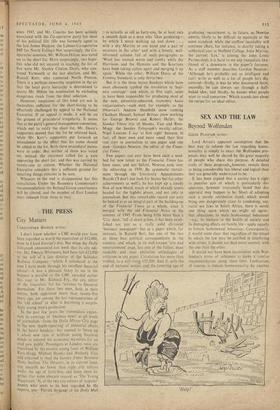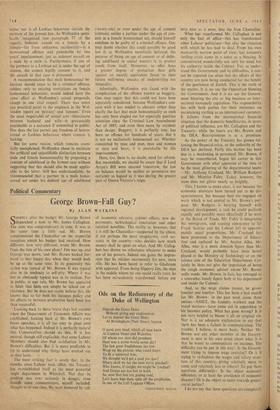GILES PLANTA IR writes:
Lord Arran's apparent assumption that the best way to reform the law regarding homo- sexuality is simply to enact the Wolfenden, pro- posals may well be shared by the great majority of people who share this purpose. A detailed study of these proposals„,however, reveals them as being considerably less liberal and logical than they are generally understood to.be.
It has been argued that a society has a right to penalise acts of which it particularly dis- approves, however irrationally based that dis- approval may happen to be. Short of .adopting such a purely retributive stand, which would bring one dangerously close to condoning, say, racial sex laws in South Africa, there is surely one thing upon which we might all agree: that objections to male homosexual behaviour --e.g., its menace to the health of society and its damaging effects on family life—apply equally to female homosexual behaviour. Consequently, it would seem clear that regardless of the extent to which the law may be justified in interfering with either, it should not deal more severely with the one than the other.
It would not have been inconsistent with Wol- fenden's terms of reference to make a concise recommendation along these lines. Lesbianism, of course, is female homosexuality by another name; nor is all Lesbian behaviour outside the purview of the present law. As Wolfenden speci- fically recognised (see paragraph 77 of the report), indecent assault on a female by a female—far from unknown, incidentally—is a homosexual offence and punishable by two years' imprisonment, just as indecent assault on a male by a male is. Furthermore, if one of the partners to a Lesbian act is under the- age of sixteen, she cannot legally consent to it, and the assault in that case is presumed.
A recommendation that male homosexual be- haviour should cease to be a criminal offence, subject only to existing restrictions on female homosexual behaviour, would indeed have the same effect as Wolfenden's actual proposals, except in one vital respect. There was never any practical point to the emphasis in the Wol- fenden report on 'privacy' and `consent.' Even the most respectable of sexual acts—intercourse between husband and wife—is presumably punishable as a nuisance if committed in public. Nor does the law permit any freedom of hetero- sexual or Lesbian behaviour where consent is lacking.
But for some reason, which remains essen- tially unexplained, Wolfenden chose to maintain the artificial and unjustifiable distinction between male and female homosexuality by proposing a concept of adulthood in the former case without suggesting that this should also be made applic- able to the latter. Still less understandably, he recommended that a partner in a male homo- sexual act under his defined age of adulthood
(twenty-one) or even under the age of consent (sixteen), unlike a partner under the age of con- sent in a female homosexual act, should himself continue to be guilty of a criminal offence. One may doubt whether this could possibly be good law if, as Wolfenden manifestly believed, the purpose of fixing an age of consent or of defin- ing adulthood in sexual matters' is to protect youth from itself. Moreover, to offer boys a greater degree of protection than girls against an exactly equivalent threat to their future well-being smacks of underwriting sex inequality.
Admittedly, Wolfenden was faced with the complication of the offence known as buggery. One may regret that this could not have been separately considered, because Wolfenden's con- cern with it has tended to obscure rather than clarify the fact that male homosexuality as such has only been singled out for especially punitive attention since the Criminal, Law Amendment Act of 1885, and even then more by accident than design. Buggery. it is perfectly true, has been an offence for hundreds of years. But it is not an exclusively homosexual act. Whether committed by man and man, man and woman or man and beast, it is punishable by life imprisonment.
Here, too, there is, no doubt, need for reform. But meanwhile, we should be aware that if Lord Arran's Bill were enacted tomorrow, the law on balance would be neither as permissive nor certainly as logical as it was during the greater part of Queen Victoria's reign.



































 Previous page
Previous page